Genghis Khan (born Temüjin, 鐵木眞; 1162 –1227 CE) was the founder and first Great Khan of the Mongol Empire. This empire, after his death, became the largest single landmass empire in history. One of the most important conquerors of all time, he was a brilliant and ruthless military campaigner whose armies conquered across Asia, west into Europe, and East into China and Korea. The Mongol armies even attacked Japan, while also fighting south down to Vietnam, Myanmar, and Thailand. Genghis Khan and his story of conquest have a fearsome reputation in local histories across Asia. Some historians estimate that 60 million people died from his military campaigns. However, his conquests also opened up the Silk Road, invigorating trade and the exchange of ideas between Europe, China, and the Middle East.
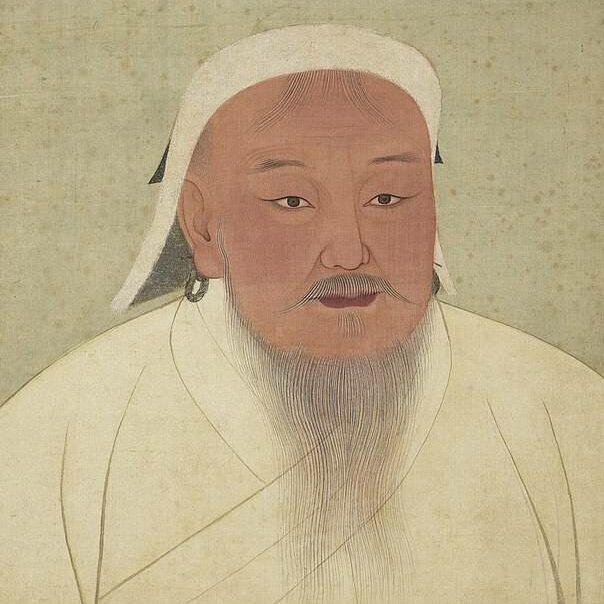
National Palace Museum, Public domain, via Wikimedia Commons
Perilous Beginnings to Universal Ruler
Genghis Khan is an honorary title meaning “universal ruler”. However, Temüjin’s early years were fraught with peril when, as a child, rivals murdered his father. This forced him to go on the run. After a period of poverty and even enslavement he began building a guerrilla army. He overcame rivalries and intrigues with his biological brothers and his blood-brother Jamukha. Genghis Khan eventually conquered and united all the warring tribes of Mongolia. From there he conquered West, South, and East into the Jin dynasty of China. His goal was to conquer in all directions to establish a world empire.
Upon his death in 1227, his sons and heirs continued expanding the Mongol Empire. They conquered the Chinese Song dynasty, Korea, Kashmir, and Pakistan. His grandson Kublai Khan conquered all of China and established the Yuan dynasty. He re-built its capital in what now is Beijing. He also attacked the Bagan Empire in Myanmar, causing its downfall. All people in Asia today have been impacted in some way by Genghis Khan and his Mongolian Empire.
Legacy of Genghis Khan and Mongolian Empire
However, less than two hundred years after his death, the Mongolian Empire had long since fractured into regional kingdoms. The heirs fought against each other and local populations rose up in revolt. The Ming dynasty in China overthrew the Mongol Yuan dynasty in 1368. Then the Ming dynasty expanded the Great Wall of China to ensure that the Mongols would not invade again. Gautama Buddha had taught the reality of impermanence and samsara. Genghis Khan’s legacy and the Mongolian Empire he birthed, lasting less than two hundred years, vividly illustrates this.
King David of Israel and Genghis Khan
Genghis Khan’s career is worth comparing to that of the Israelite King David. King David (1035 – 970 BCE), like Genghis Khan, was threatened in his youth with an inter-clan rivalry by the first Israelite King Saul. Saul forced David to flee, hiding in various places while gathering a following of men who would eventually form the core of his army. David was a skillful warrior and fearless battle strategist. He famously fought and killed the giant Goliath who had put terror into the entire Israelite nation. In these regards David was similar to Genghis Khan.
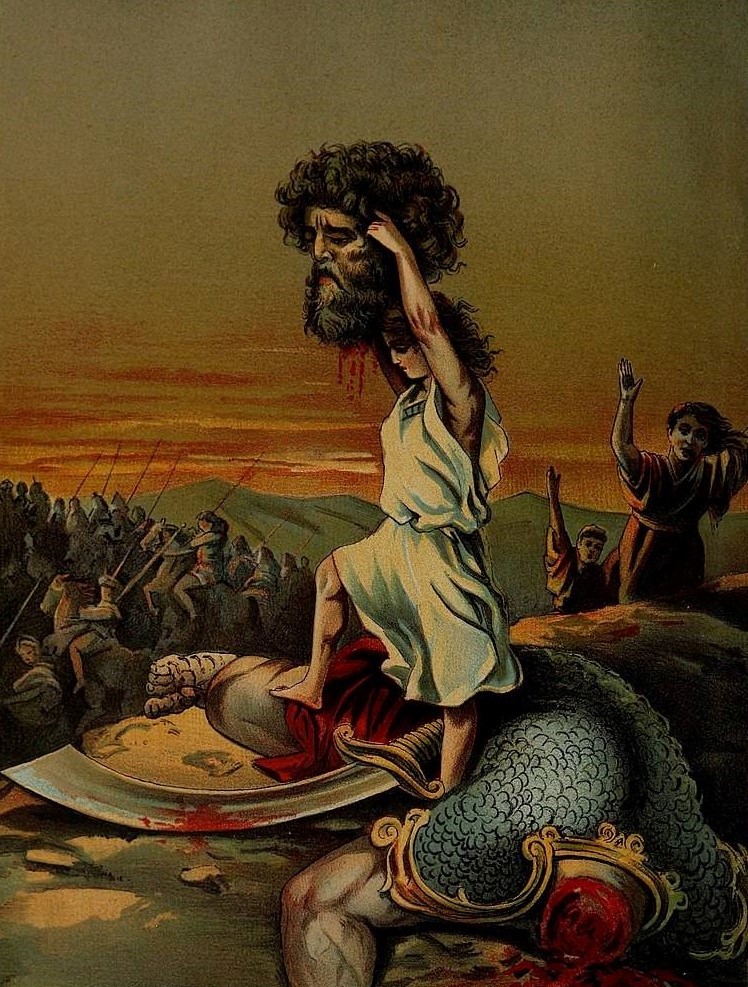
Pollard, Josephine, 1834-1892, No restrictions, via Wikimedia Commons
David eventually became King of Israel, establishing his capital city in Jerusalem, on Mount Moriah. This was the place where his ancestor Abraham had offered the sacrifice pointing to Jesus’ sacrifice. David established a royal dynasty, like Genghis Khan did. Though he subdued nations surrounding Israel, he never began an empire-building military campaign like Genghis Khan did. Instead he devoted the second half of his life to making preparations for building a Temple to the Creator God. This Temple was built by his successor and son, King Solomon, who was famous for his wealth and wisdom.
In response to David’s devotion, the Creator God promised that one of his heirs would one day establish a kingdom. This kingdom would eventually, like Genghis Khan tried to do, become a global Kingdom. Various prophets over the next several hundred years predicted how and when this would occur. They recorded these oracles in the various books of the Hebrew Bible.
Life in David’s Dynasty, Mongol Empire, or Society Today
As with Genghis Khan, the succeeding heirs after King David were not as competent as he was. They were often wicked and violent, so the dynasty of David began to decline. Living in their kingdom was like living in the Mongolian Empire, or like living under the rule of the many dictators today. The war and fighting between people and between nations did not stop, just like today. The corruption and exploitation of the rich over the poor was rampant, just like today. Death and misery existed all around, just like today.
The Fall of David’s Royal Dynasty
So King David’s successors did not follow the Creator’s Ten Commands. Therefore, the Creator God sent prophets to plead with them to repent from their evil ways. Their warnings, writings, and prophecies were also added to the inspired Books in the Bible. As explained here, the Israelites were finally conquered and deported by the Babylonians. Then they returned to Jerusalem under the Persian Empire. Through this time prophets continued to receive oracles. These messages were written in the last books of the Old Testament of the Bible.
David and the Prophets in a Historical Timeline
The image below summarizes most (but not all as there is not room for all) of these prophets. The width of the bars shows the lifespan of each particular prophet. The color code follows the status of the Israelites according to their history.
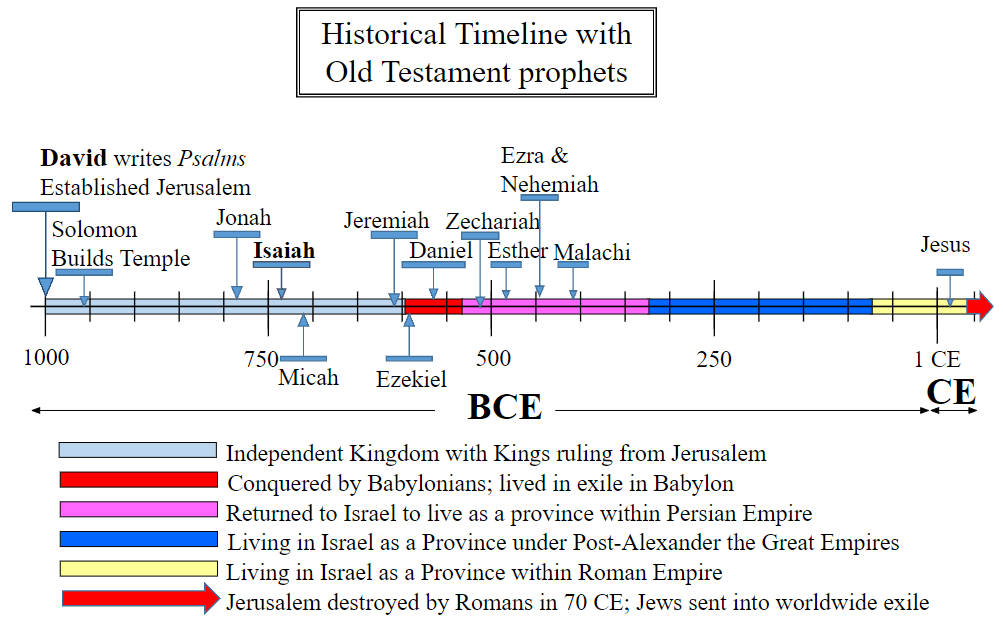
The Promise of a Coming Kingdom
But the prophets foresaw one day – in the future – when a new rule would be established from this special heir of David. This kingdom would not be subject to decay, impermanence, and samsara.
13 Your kingdom is an everlasting kingdom,
and your dominion endures through all generations.The Lord is trustworthy in all he promises
Psalm 145:13
and faithful in all he does.
This would be a Kingdom with justice, mercy, love, and peace. The prophet Isaiah predicted how life would be in the rule of this special heir of David.
4 He will judge between the nations
Isaiah 2:4
and will settle disputes for many peoples.
They will beat their swords into plowshares
and their spears into pruning hooks.
Nation will not take up sword against nation,
nor will they train for war anymore.
No more war! This certainly does not represent the time of the Mongolian Empire down to our world today.
The Peace in the New Kingdom – Even the Ecology
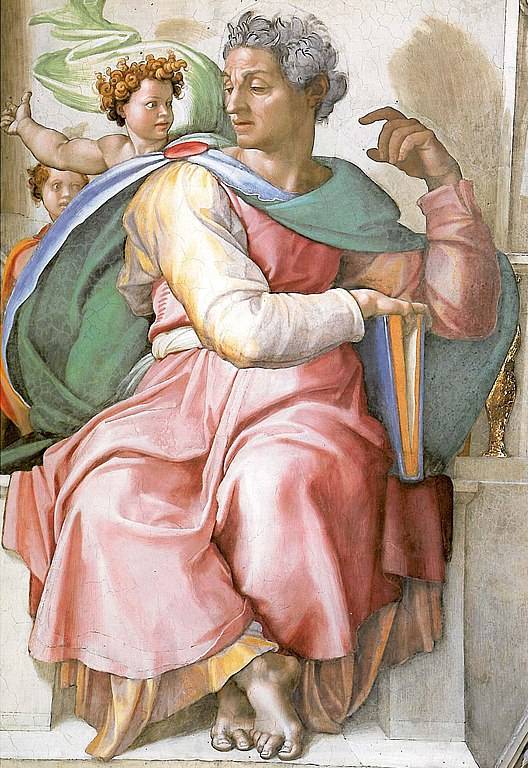
Michelangelo, Public domain, via Wikimedia Commons
But even more than peace between people, the prophecies even predicted a change in natural ecology.
6 The wolf will live with the lamb,
Isaiah 11:6-9
the leopard will lie down with the goat,
the calf and the lion and the yearling together;
and a little child will lead them.
7 The cow will feed with the bear,
their young will lie down together,
and the lion will eat straw like the ox.
8 The infant will play near the cobra’s den,
and the young child will put its hand into the viper’s nest.
9 They will neither harm nor destroy
on all my holy mountain,
for the earth will be filled with the knowledge of the Lord
as the waters cover the sea.
Greatness in this Empire would not be measured by conquests, landmass and size of armies. Instead the depth of the peace in nature and between peoples would be its measure of greatness.
Security and Lifespans in the Coming Kingdom
But the prophecies extend even further to lifespans and personal security.
20 “Never again will there be in it
Isaiah 65:20-25
an infant who lives but a few days,
or an old man who does not live out his years;
the one who dies at a hundred
will be thought a mere child;
the one who fails to reach a hundred
will be considered accursed.
21 They will build houses and dwell in them;
they will plant vineyards and eat their fruit.
22 No longer will they build houses and others live in them,
or plant and others eat.
For as the days of a tree,
so will be the days of my people;
my chosen ones will long enjoy
the work of their hands.
23 They will not labor in vain,
nor will they bear children doomed to misfortune;
for they will be a people blessed by the Lord,
they and their descendants with them.
24 Before they call I will answer;
while they are still speaking I will hear.
25 The wolf and the lamb will feed together,
and the lion will eat straw like the ox,
and dust will be the serpent’s food.
They will neither harm nor destroy
on all my holy mountain,”
says the Lord.
Security, peace, immediate answer of prayers… None of these prophecies have been fulfilled – yet. Some might think that the prophets were mistaken in these hopeful prophecies, but the literal fulfillment of the Sign of the Virgin’s Son give us a reason to take these prophecies seriously.
What Makes a Kingdom
If we reflect for a moment we can understand why they have not occurred yet. The prophets uttered their oracles in the context of the Kingdom of God, the rule of the Creator God in lives and affairs of people.
So why does the Creator God establish His Kingdom so slowly? Why is it taking so long? Why has it not come about yet?
When you think about it, all kingdoms have the following attributes:
- A King or Ruler
- Citizens
- A Constitution or Law
- Nature
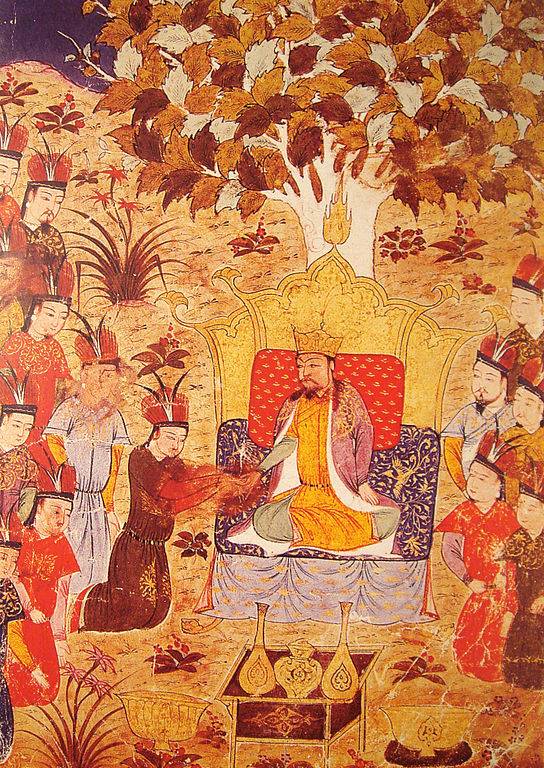
Rashid al-Din, Public domain, via Wikimedia Commons
For example, Genghis Khan and the Khans that followed him were the rulers of the Mongolian Empire. Today we have heads of government, whether Prime Ministers or Presidents that rule. Genghis Khan instituted the Yassa code of law for all people in the Mongolian Empire to follow. All nations today also have a constitution or law which determines the rights and responsibilities of all its citizens. The Mongolian Empire also had a nature, with a certain physical size, climate, and natural resources, as do all countries today. All Empires and countries have their destinies bound in impermanence, samsara, and karma. We know this by observing how all Empires eventually dissolve in one way or another.
How do Kingdoms obtain their citizens? The Mongolian Empire obtained its citizens by conquest. Then children were simply born into it. Today most people are simply born into the nation for which they are a citizen. In rarer cases people can choose citizenship by emigrating and applying for a citizenship elsewhere.
The Kingdom of God – Invited In
These four basic attributes are also true of the Kingdom of God. The oracles prophesied that this Kingdom would have a enduring Nature (glorious and everlasting). Its Constitution would be based on peace, fairness, and harmony in nature. The ruler in this Kingdom would be the special heir of King David. We look further at this in the next article.
The Kingdom of God will obtain its citizens by invitation. Here is how the prophet Isaiah invites all people who want to be citizens in this Kingdom.
1 “Come, all you who are thirsty,
come to the waters;
and you who have no money,
come, buy and eat!
Come, buy wine and milk
without money and without cost.
2 Why spend money on what is not bread,
and your labor on what does not satisfy?
Listen, listen to me, and eat what is good,
and you will delight in the richest of fare.
3 Give ear and come to me;
listen, that you may live.
I will make an everlasting covenant with you,
my faithful love promised to David…6 Seek the Lord while he may be found;
Isaiah 55:1-3, 6
call on him while he is near.
The Creator God invites all those ‘thirsty’ for this Kingdom to come to it. The blessing given to the ancient king David will also be extended to those who do come.
If you get an invitation to come to something, that means you do not yet have it. But since the Creator God invites us, this means that He wants us to become citizens in His Kingdom.
Perhaps at this point questions about ‘how’ and ‘when’ regarding the coming of this Kingdom arise in your mind. We look at them subsequently. In the meantime, there is one question that only you can answer:
Do I want to be in this Kingdom?
The Prophets – Anticipating the Coming of the ‘Christ‘
Throughout their prophecies of this coming Kingdom they also foresaw details of the coming heir of David. The title they gave to this coming one was ‘Christ’. As Genghis Khan is first a title, not a name, likewise ‘Christ’ is first and foremost a title. Where does this title originate? What does it mean? We look at this next.